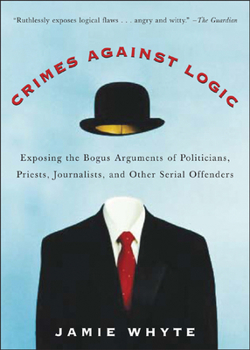Crimes Against Logic: Exposing the Bogus Arguments of Politicians, Priests, Journalists, and Other Serial Offenders
Select Format
Select Condition 
Book Overview
Uncover the truth under all the BS In the daily battle for our hearts and minds--not to mention our hard-earned cash--the truth is usually the first casualty. It's time we learned how to see through the rhetoric, faulty reasoning, and misinformation that we're subjected to from morning to night by talk-radio hosts, op-ed columnists, advertisers, self-help gurus, business "thinkers," and, of course, politicians. And no one is better...
Format:Paperback
Language:English
ISBN:0071446435
ISBN13:9780071446433
Release Date:October 2004
Publisher:McGraw-Hill Companies
Length:176 Pages
Weight:0.38 lbs.
Dimensions:0.5" x 5.0" x 7.0"
Customer Reviews
3 ratings
Wish I'd written it
Published by Thriftbooks.com User , 18 years ago
Crimes Against Logic follows in the tradition of Lynne Truss's Eats, Shoots, & Leaves: it is another British book that is short, humorous, strongly written, and emphasizes being correct over being trendy or popular. But while Truss wrote in favor of being a stickler for punctuation so as to be better understood, Jamie Whyte writes in support of being a stickler for logic so as to better understand. In a dozen brief chapters, he discusses different errors in thinking that he thinks are the most common in modern discourse -- errors like the ad hominem fallacy (though he does not use its technical name), shifting definitions of terms in the middle of an argument, and various misuses of statistics. In doing so, and in the examples he uses, Whyte manages to get across a complete manifesto in favor of logic as the best tool for discovering the truth, and in favor of using the truth (rather than emotions, faith, or wishful thinking) as a basis for deciding what to believe and what to do. Whyte's arguments are simple, his writing is emphatic, and, in many cases, his examples are original, so I will find it useful the next time I need ammunition to make one of the points he deals with. And I enjoyed Whyte's humorous style. However, like me when I get into the mood Whyte clearly was in when he wrote this book, Crimes Against Logic sometimes comes across as arrogant and condescending. This has its amusement value for people like me who already buy what Whyte has to say, but probably hurts his educational mission. Whyte may be a bit smug, but he's got a lot to be smug about. Crimes Against Logic is the best rationalist book I have read yet -- the sort of book that makes me daydream about buying copies for friends and enemies alike, sending copies to libraries, even running for school board to make it required reading. The people who don't know what Whyte is teaching in Crimes Against Logic desperately need to know, and the people who already try to practice what Whyte preaches will enjoy this witty refresher course.
The Value of Critical Thinking
Published by Thriftbooks.com User , 19 years ago
This little tome exposes the habits of lazy thinking that have become ubiquitous. Everything from the common confusion between correlation and causation, to the faulty logic of Argument by Popularity (50,000,000 Elvis Fans Can't Be Wrong). Politicians and priests take the biggest lumps, but even everyday prejudices (like only buying tickets for the really big Lotto) also come in for punishment. It's a startling dope-slap of a book, concise and unbelaboured, exhibiting clarity and alacrity with no small measure of good humour and self-effacing wit. The amateur logician will find much to gird himself in the battle against the decline of mathematical literacy and common sense in our oh-so-modern yet oh-so-superstitious world.
Funny and informative
Published by Thriftbooks.com User , 19 years ago
This is a very entertaining little book about bad reasoning. I laughed out loud on several occasions and have found myself reading sections to friends who I knew would enjoy them (or wouldn't, in some cases!). I was already familiar with some of the fallacies, but a few were new to me, such as the fallacies of equivocation and begging the question. Once explained, most of the fallacies Whyte highlights are easily understood. Which only makes it more incredible that they are so common, as shown by the incredibly wide range of examples Whyte draws on. I now find myself playing "spot the fallacy" when reading the paper or watching the news. It's fun for a while, until you start to get angry. Whyte is pretty harsh on religion and some readers won't like it. But let's be honest, there is a lot of bad reasoning about religion. It would be ridiculous for a book on common fallacies to avoid the topic. Apart from his apparent atheism, Whyte's substantive views are difficult to discern. He usually does a good job of sticking to the logic of arguments rather than the truth of their conclusions. And his occasionally angry tone, which some reviewers don't like, is usually appropriate and often very funny. I can highly recommend this book.





